Rating: 6
Best Song: “They Don’t
Care About Us”
(Reviewers’ note: I am
reviewing the second disc of HIStory featuring all new material as it
was packaged with a greatest hits album as the first disc.) My thoughts on the
first disc are pretty simple: just get the original albums, there are only four
of them! As for the second disc, it is more or less a sequel to Dangerous,
but with all of the negative aspects exacerbated. Once again, it’s needlessly
long, and not really in a way that makes any sense. In his attempts to appeal
to all audiences, the result is totally incoherent as an album. There are
several terrible songs that make me long for the relative charms of “Heal the
World.” Perhaps predictably after the child molestation scandal, the paranoia
in his lyrics is intensified, and not really in a way that redeems the man. Yet
for all that, I still give HIStory a positive rating, and don’t
think it entirely deserves its reputation as a disappointment.
Although they make up a smaller portion of the album
than ever, there are at least several songs here that compare well to anything
in Michael's back catalog. He finally gets the celebrity duet right with the opener
“Scream” by de-emphasizing the significance of the duet with his sister Janet
to the point where the song wouldn’t really have been affected either way if he
had just sang the whole thing himself. That may make it seem pointless, but
“Scream” is a perfectly fine single with a level of energy to match the
spectacle of its $7,000,000 music video.
I’ll avoid weighing in on the controversial lyrics of “They Don’t Care About
Us" and instead offer
my regrets that the critical focus on the lyrics marred what I see as one of
his best songs ever, musically. Jackson delivers the simplistic, harsh verses
with conviction and the melodic chorus provides the perfect contrast, giving
the song an emotional momentum that it never relinquishes. The production, with
its ghostly choirs of multi-tracked Michael Jacksons, also reminds me of the similar torment I felt Jackson
captured with “Who Is It,” making me wish that he would sit in the producer’s
chair more often.
As always, I feel the best songs here are
generally the ones that Jackson wrote and produced himself, rather than the
ones done in tandem. “Stranger in Moscow” is a rare ballad for him that avoids
mawkishness and/or tedium, instead nicely evoking the isolated feeling of the
lyrics with a sparse guitar arrangement before culminating in an impassioned
coda. “Earth Song,” though relatively unknown, at least in the US, challenges
“Man in the Mirror” as his greatest save-the-world ballad, and perhaps proving
that these types of songs are either really great or really bad. But in this
case, though the initial chorus veers towards the sappy, the song builds to a
dramatic crescendo with Jackson screaming out things like “What about
elephants?” “What about crying whales?” “What about forest trails?” over the
backing vocals of the Andrea Crouch Choir, stalwarts in all of his humanitarian
epics. It could be about llamas for all I care, but like “Man in the Mirror,”
there’s undeniable power to it, and although I suspect he felt as sincerely
about “Heal the World” as he did about this one, he was actually able to
capture that sincerity and passion in his music here.
I don’t know that if Jackson would have been able to
sustain creative momentum if he had written and produced everything himself
(actually, the last 1/3 of the album is almost definitely a sign that he couldn’t have),
but I do feel that the attempts to stay current with the latest trends in
R&B/hip-hop by bringing in famous producers of the time (in this case,
Jimmy Jam, Terry Lewis, and Dallas Austin) don’t entirely work. Theoretically,
the generic HIStory track isn’t so different from the generic Dangerous
track in this regard, but whether it’s just a greater level of nostalgia on my
part, here I find myself dying for the melodic choruses to emerge from
the over-compressed murk on songs like “Tabloid Junkie” and “This Time Around.”
The thudding bass and pseudo-rap verses might have worked for some artists, but
I don’t think they fit all that well with this particular artist, and these
particular songs. That said, Jackson is guilty of the same sins on some of the
songs he did produce himself (“D.S.” and “Money”), so I can’t exactly blame his
producers. I do like all the songs mentioned (“Tabloid Junkie” and “D.S.” have
particularly outstanding choruses) but compared to the best songs on the album,
I feel that there are multiple visions for how the album would sound that
openly conflict with each other.
Still, these are largely forgivable issues and if HIStory
went on alternating prime Jackson material with more forgettable, but still
decent attempts to stay modern, I would give it a rating pretty close to the
one I gave Dangerous. Unfortunately, Michael had to go and prove that
his creative instincts were starting to decay by including several truly, truly
terrible songs. It all starts at track nine: “Childhood,” from the Free
Willy 2 soundtrack, is a ballad in the basic “Heal the World” style, but
one with no discernible melody, just copious amounts of string instruments in
the standard Hollywood vein. I suppose the lyrics about him having lost his
childhood could be construed as surprisingly self-aware, but that doesn’t make
them any less banal as presented here. Worst, it doesn’t really make any sense
in the context of the album up to that point, but instead seems like it was
included solely to cross-promote his work with Free Willy 2. Still, the
album recovers a little bit after that point, before ending on a truly noxious
stretch over the last three songs. The title track was obviously intended as an
epic, with the song both beginning and ending with historically significant
news clips. But the combination of modernistic verses with a sappy, purportedly
anthemic chorus just doesn’t go together at all, and in situations where a song
is attempting to be some sort of grand statement, but is instead an incoherent
mess, I can’t help hating it way more than if it were just trying to be a
catchy pop song. I do like the bit leading into the chorus (“How many people
must there be…”) but that’s not enough to save the song as a whole.
“Little Susie” revisits the song structure of “Will
You Be There,” again sampling classical choral music for several minutes before
leading into the actual song, which takes up only about 3 minutes of its 6
minute length. Although it doesn’t help that the main portion of the song is
creepy, with lyrics, to paraphrase, about ‘a girl who fell down the stairs and
nobody cared,’ it might be salvageable if the structure of the song made any
sense at all. But the epic introduction and crashing strings are totally at
odds with the fairly simplistic vocal melody. And sampling “Pie Jesu” for
nearly half of the song does not automatically lend your song the somber
atmosphere you’re hoping for. Instead, it detracts from it. Finally, the closing
cover of Charlie Chaplin’s “Smile” is perhaps not as offensive as the preceding
two songs, but is still pretty bad, due to the utter lack of creativity in the
arrangement (pure Hollywood schmaltz).
So I do like it when musical artists take creative
risks, and while some of Jackson’s risks do in fact succeed on this album, more
of them fail terribly. Still, while four really bad songs is enough to drag
down the rating of the album considerably, there are still eleven good to great
songs here. His artistic decline was no doubt under way, but HIStory at
least still spotlights the good if also the bad. Unfortunately, his next and
final full studio release was destined to make me long for the relative charms
of this album.


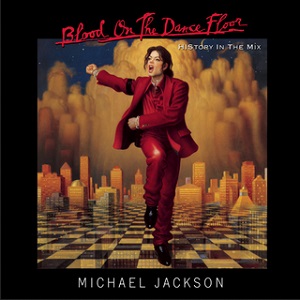
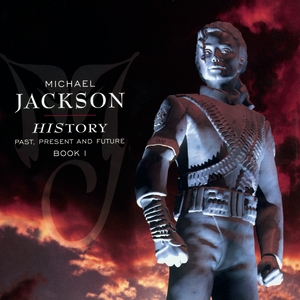
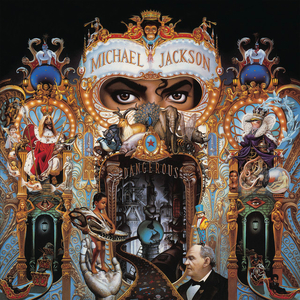

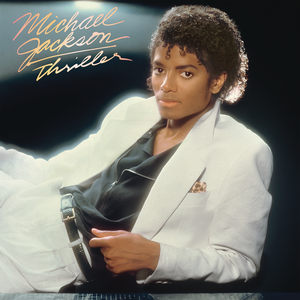
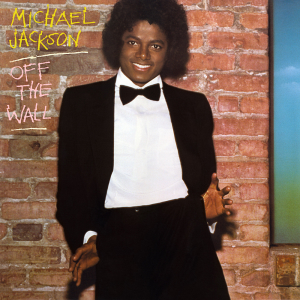


.jpg)
.jpg)

